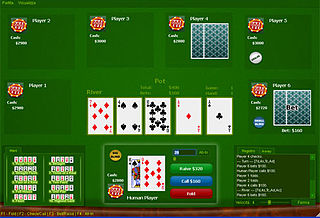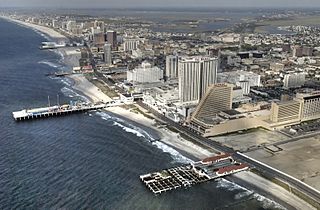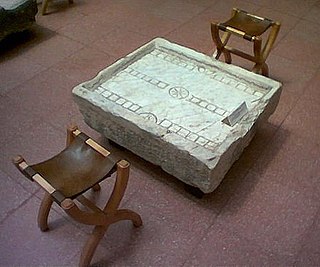
Gambling is the wagering of something of value on a random event with the intent of winning something else of value, where instances of strategy are discounted. Gambling thus requires three elements to be present: consideration, risk (chance), and a prize. The outcome of the wager is often immediate, such as a single roll of dice, a spin of a roulette wheel, or a horse crossing the finish line, but longer time frames are also common, allowing wagers on the outcome of a future sports contest or even an entire sports season.

Native American gaming comprises casinos, bingo halls, slots halls and other gambling operations on Indian reservations or other tribal lands in the United States. Because these areas have tribal sovereignty, states have limited ability to forbid gambling there, as codified by the Indian Gaming Regulatory Act of 1988. As of 2011, there were 460 gambling operations run by 240 tribes, with a total annual revenue of $27 billion.

Online gambling is any kind of gambling conducted on the internet. This includes virtual poker, casinos, and sports betting. The first online gambling venue opened to the general public was ticketing for the Liechtenstein International Lottery in October 1994. Today, the market is worth around $40 billion globally each year, according to various estimates.

In the United States, gambling is subject to a variety of legal restrictions. In 2008, gambling activities generated gross revenues of $92.27 billion in the United States.

The British Columbia Lottery Corporation is a Canadian Crown corporation that manages all legal gambling products in British Columbia including lottery tickets, casinos and online gambling. It is based in Kamloops, with a secondary office in Vancouver. It consists of three business units: Lottery, Casino and eGaming. Its annual revenues exceed CDN $1.6 billion. It has 890 direct employees. Its service providers, who run casinos on its behalf under contract, have an additional 8,300 employees.
Gambling in India varies by state; states in India are entitled to formulate their own laws for gambling activities. Some states like Goa have legalised casinos. Common gambling activities like organized betting are restricted except for selective categories including lottery and horse racing.

The Gambling Commission is an executive, non-departmental public body of the Government of the United Kingdom responsible for regulating gambling and supervising gaming law in Great Britain. Its remit covers arcades, betting, bingo, casinos, slot machines and lotteries, as well as remote gambling, but not spread betting. Free prize competitions and draws are free of the Commission's control under the "Gambling Act 2005".
Gambling in South Africa has been heavily restricted since 1673, with South Africa's Gambling Act of 1965 officially banning all forms of gambling except betting on horse racing which existed as a sporting activity.
Gambling in Pennsylvania includes casino gambling, the Pennsylvania Lottery, horse racing, bingo, and small games of chance conducted by nonprofit organizations and taverns under limited circumstances. Although casino gaming has been legal for less than two decades, Pennsylvania is second only to Nevada in commercial casino revenues.
Gambling in France holds a current legal status. According to a TGM Research report, 49% of people in France participated in some form of betting in the past 12 months in 2022. This includes 28% who bet on sports.

Gambling in New Jersey includes casino gambling in Atlantic City, the New Jersey Lottery, horse racing, off-track betting, charity gambling, amusement games, and social gambling. New Jersey's gambling laws are among the least restrictive in the United States. In 2013, the state began to allow in-state online gambling. Five years later in 2018, the state won a lawsuit that dismantled Nevada's monopoly on legal sports betting.

Gambling in Italy has existed for centuries and has taken on many forms. Its dates back to the days of the Roman Empire, when the predecessor of the modern game of backgammon, Ludus Duodecim Scriptorum, became popular among Roman legionnaires. It is also due to them that the game came to other European countries.
Legal forms of gambling in the U.S. state of North Carolina include the North Carolina Education Lottery, three Indian casinos, charitable bingo and raffles, and low-stakes "beach bingo". North Carolina has long resisted expansion of gambling, owing to its conservative Bible Belt culture.
Legal forms of gambling in the U.S. state of Texas include the Texas Lottery; parimutuel wagering on horse and greyhound racing; charitable bingo and raffles; and three Native American casinos. Other forms of gambling are illegal in Texas.
Gambling has been present in the Philippines since at least the sixteenth century. Various legal and illegal forms of gambling are found almost all over the archipelago. The government manages gambling through the Philippine Amusement and Gaming Corporation (PAGCOR) a state-owned enterprise which both operates a number of individual casinos and in turn acts as a regulator to privately owned casino operators. Since 2016 PAGCOR has also granted operating licenses and overseen the regulation of growing online gambling sector serving offshore markets. Casino gambling and integrated resorts have become a key component of the Philippines appeal as a tourist destination with more than twenty casinos found in Metro Manila alone.
Legal forms of gambling in the U.S. state of Massachusetts include casinos, sports betting, parimutuel wagering on horse racing, the Massachusetts Lottery, and charitable gaming. The Massachusetts Gaming Commission regulates commercial operations under state jurisdiction.

The Michigan Gaming Control Board (MGCB) is a gaming control board in Michigan that provides oversight of the state's gaming industry, which was founded and authorized by statewide voting in November 1996.

Legal forms of gambling in the U.S. state of California include cardrooms, Indian casinos, the California State Lottery, parimutuel wagering on horse racing, and charitable gaming. Commercial casino-style gaming is prohibited.
Legal forms of gambling in the U.S. state of Maine include parimutuel wagering on horse races, sports betting, the Maine Lottery, two casinos, and charitable gaming.
Legal forms of gambling in the U.S. state of Connecticut include two Indian casinos, parimutuel wagering, charitable gaming, the Connecticut Lottery, and sports betting.









